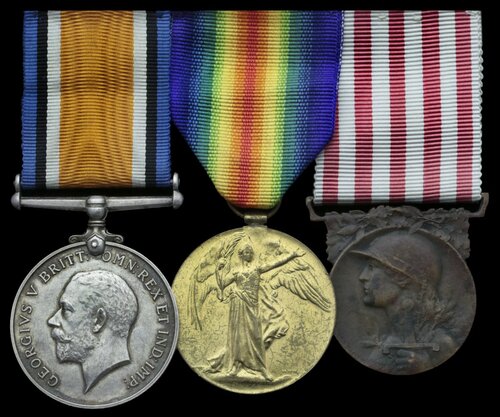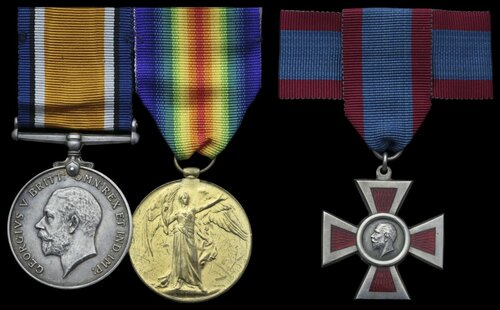Auction: 22001 - Orders, Decorations and Medals
Lot: 336
A family collection of two sisters who both served with the V.A.D in the Great War
The R.R.C. group of three awarded to Matron M.F. Courtenay, Voluntary Aid Detachment, who served as Matron of Mountgreenan Auxiliary Hospital, Ayrshire and later saw overseas service driving ambulances
Royal Red Cross, 2nd Class, (A.R.R.C.), silver and enamel, with bow riband; British War and Victory Medals (M.F. Courtenay. V.A.D.), the last two mounted as worn, good very fine (3)
Three: Sister A. R. Courtenay, Scottish Women’s Hospital, who served with the ‘Elsie Inglis unit’, at ‘Dead Horse Camp’ in the Serbian Sector on the Salonica Front
British War and Victory Medals (A. R. Courtenay), France, Republic, Commemorative Medal for War 1914-18, mounted as worn, minor contact wear, very fine (3)
A.R.R.C. London Gazette 24 October 1917
Mary Florence Courtenay was born at Carlow, Ireland on 9 December 1891, the daughter of William and Annie Courtenay. She was raised by her step-mother Lousia in Dunleer, Co. Louth, Ireland. She served as Matron of the Mountgreenan Auxiliary Hospital but also saw service as a driver and chauffer in France with the Voluntary Aid Detachment from 2 May 1917-28 April 1919. After the war she spent some time in Bombay India, returning to Britain on 10 May 1928 she married John Denys De Carteret Guille, at Mullingar, Ireland on 18 July 1928; sold together with copied research including census data, M.I.C., Red Cross service records and a London Gazette entry.
Annie Rebecca Courtenay was born at Ardee, Ireland 16 November 1892, the daughter of William and Annie Courtenay. She was raised by her step-mother Lousia in Dunleer, Co. Louth, Ireland, going with her to Dublin in 1911 before moving in with her older sister Mary at the age of 18. Joining the ‘Elsie Inglis unit’ in April 1918 in the Serbian Section of the line on the Salonica Front. The camp in which they worked was christened ‘Dead Horse Camp’ due to its location surrounded by partially buried horse carcasses. Small wonder then that the unit was twice stricken with Malaria during the summer of 1918. The disease was not the only danger as they were required to drive the narrow mountain roads, often under shellfire, to transport their charges. One of the main troubles they experienced was keeping pace with the rapid Serbian advance, relocating to Skopje in October 1918 and it was here that they were stationed when the influenza epidemic struck. Not long after this Annie returned to Britain while the rest of her unit moved to Sarajevo; sold together with copied research including an M.I.C. and typed biography.
Subject to 20% VAT on Buyer’s Premium. For more information please view Terms and Conditions for Buyers.
Sold for
£750
Starting price
£270







